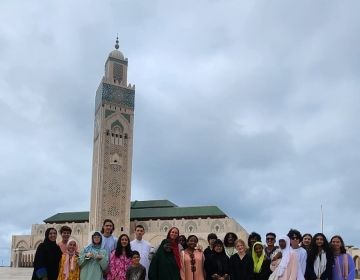North Africa Possibly Cradle of Civilization, Scientists Find 2.4 Million-Year-Old Artifacts- Article written by Shaquile Goff
A team of archaeologists found tools and other objects in Algeria, disproving previous theories about humanity’s birthplace.
Rabat – An international team of archaeologist found “stone tools and cut animal bones” that indicate the earliest pre-humans could have originated there.
The artifacts were found in the Ain Boucherit excavation site near Setif, a town 300 kilometers east of Algiers. Scientists found two distinct groups of artifacts from the site: one group dates back to about 1.9 million years ago, and the other group can be traced to 2.4 million years ago, according to Science News.
The experts analyzing the artifacts believe the area was a prehistoric spot that hunters used to butcher the meat from their kills.
The archaeologists found several “Oldowans,” prehistoric knife-like rocks academics previously thought only existed in East Africa. They also found several cut bones that belonged to the prehistoric ancestors of the modern elephant, crocodile, hippopotamus, and horse.
The Setif team was led by Dr. Mohamed Sahnouni, an Algerian-American archaeologist for the Stone Age Institute at Indiana University.
According to Dr. Sahnouni’s team, their work “show[s] that the North African savanna corridor and the East African one were [once] connected,” and offer a chance for scientists to reexamine earlier findings.
Currently, the oldest found archaeological piece is a 3.3 million year old tool located in Kenya, according to BBC. But earlier this year, scientists also found both the oldest bone knife, as well as the oldest nuclear DNA in Africa, in Morocco. Scientists also discovered a small site in Saudi Arabia that is one of the oldest in the world. This proves that Arabia and North Africa had a much more important role in the development of early pre-human hominids than scientists and historians previously thought.
Related Posts

Eat, Drink, Explore: Rabat
BEST FOOD TO EAT IN RABAT Not only is couscous the national dish of Morocco – it also originated there! You’ll find this tasty grain throughout much of North Africa... keep reading

A Weekend Getaway to the Blue City
A breathtaking blue oasis nestled in the Rif Mountains of Morocco, Chefchaouen is a picturesque town renowned for its vivid blue-painted buildings and rich cultural heritage. This past weekend, the... keep reading

A Visit to Casablanca's Hassan II Mosque
Our Language and Culture students wrapped up this week with a visit to Casablanca’s Hassan II Mosque. As the third largest mosque in the world, and largest in Africa, Hassan... keep reading